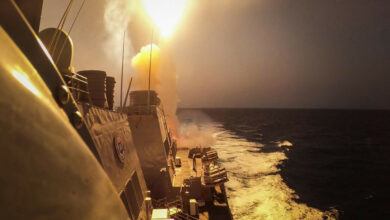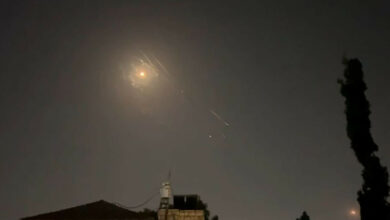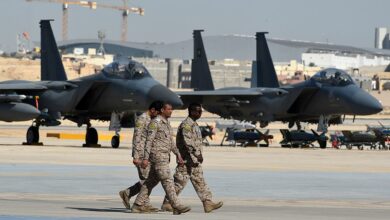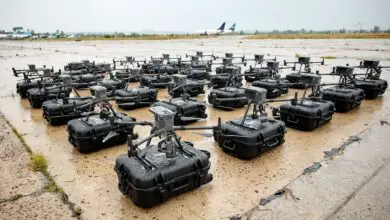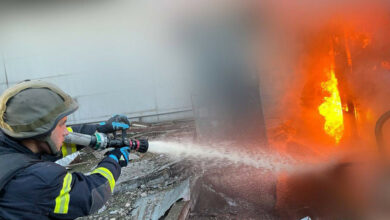Saudi airstrikes hit rebel-held Yemen capital Sana’a
Warplanes struck in and around the rebel-held Yemeni capital on Thursday, May 16, two days after the insurgents claimed drone strikes that shut a key oil pipeline in neighboring Saudi Arabia, the rebels and witnesses said.
One witness told AFP he heard a loud explosion in the heart of Sana’a.
The Houthi rebels’ Al-Masirah television blamed “aircraft of the [Saudi-led] aggression.”
In an initial tweet, the broadcaster reported six strikes on the Arhab district of Sana’a province. It then reported further strikes, including one in Sana’a itself.
A second witness told AFP that the raids began around 8 a.m. (0500 GMT) while many Yemenis were asleep.
“There were many strikes,” he added.
“Preliminary reports indicate that five children have died and 16 more are wounded; additional causalities, including health workers, have been reported,” U.N. Humanitarian Coordinator in Yemen Lise Grande said.
The Saudi-led coalition backing the Yemeni government confirmed that its warplanes were bombing rebel targets.
“We have begun to launch air strikes targeting sites operated by the Houthi militia, including in Sana’a,” a coalition official, who declined to be identified, told AFP.
The airstrikes killed at least six people and wounded 10, a doctor at a Sana’a hospital told AFP.
The casualties were all brought into the Republican Hospital from the same Sana’a neighborhood, Dr Mokhtar Mohammed said.
Saudi tragted civilian areas in Sanaa in response to Houthis attack of their oil pipelines. Families still under the rubble #Yemen pic.twitter.com/DEENZglwwC
— Osamah Al-Rawhani (@OsamahAlrawhani) May 16, 2019
On Tuesday, the Houthi rebels claimed responsibility for twin drone strikes on Saudi Arabia’s main east-west oil pipeline, saying that they were a response to “crimes” committed by Riyadh during the bloody air war it has led in Yemen since March 2015.
The pipeline, which can carry five million barrels of crude per day, provides a strategic alternative route for Saudi exports if the shipping lane from the Persian Gulf through the Strait of Hormuz is closed.
Saudi Arabia’s deputy defense minister, Khalid bin Salman, accused Iran of ordering drone attacks on two of its oil pumping stations.
He said the “attack by the Iranian-backed Houthi militias against the two Aramco pumping stations proves that these militias are merely a tool that Iran’s regime uses to implement its expansionist agenda in the region.”
“The terrorist acts, ordered by the regime in Tehran, and carried out by the Houthis, are tightening the noose around the ongoing political efforts,” he tweeted Thursday.
The terrorist acts, ordered by the regime in Tehran, and carried out by the Houthis, are tightening the noose around the ongoing political efforts.
— Khalid bin Salman خالد بن سلمان (@kbsalsaud) May 16, 2019
Iran has repeatedly threatened to close the vital conduit for global oil supplies in case of a military confrontation with the United States.
Mohammed Ali al-Houthi, head of the Houthi’s Supreme Revolutionary Committee, has denied the rebels were acting on Iran’s behalf, saying they were defending themselves against the Saudi coalition.
The Saudi cabinet called on Wednesday for “confronting terrorist entities which carry out such sabotage acts, including the Iran-backed Houthi militias in Yemen.”
Key ally the United Arab Emirates echoed the call.
“We will retaliate and we will retaliate hard when we see Houthis hitting civilian targets like what happened in Saudi Arabia,” the UAE minister of state for foreign affairs, Anwar Gargash, said on Wednesday.
Saudi Arabia and its allies intervened in Yemen when President Abd Rabbo Mansour Hadi fled into Saudi exile as the rebels closed in on his last refuge in Yemen’s second city Aden after sweeping through most of the rest of the country.
The intervention has retaken much of the south but the capital and most of the populous central highlands remain in rebel hands.
The United Nations calls the situation in Yemen the world’s worst humanitarian crisis, with around 10,000 people dead and millions pushed to the brink of starvation.
This story was updated on May 17 with a statement from the U.N. Humanitarian Coordinator in Yemen.
With reporting from AFP



